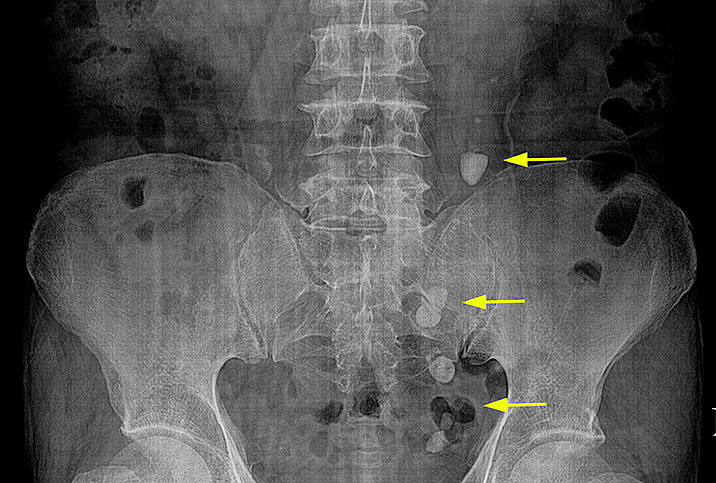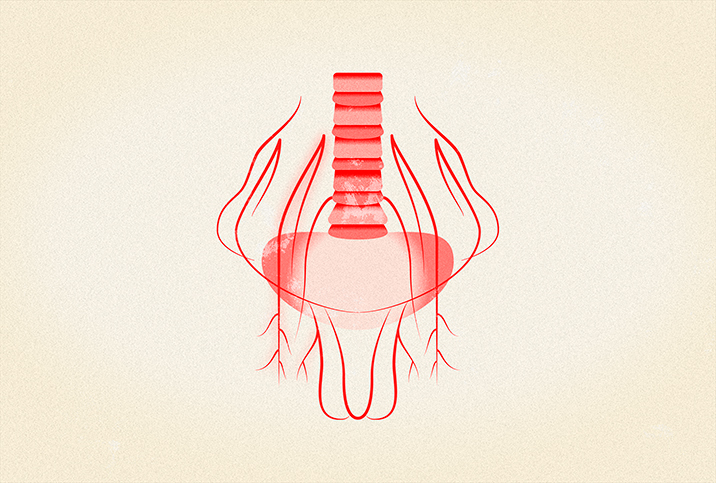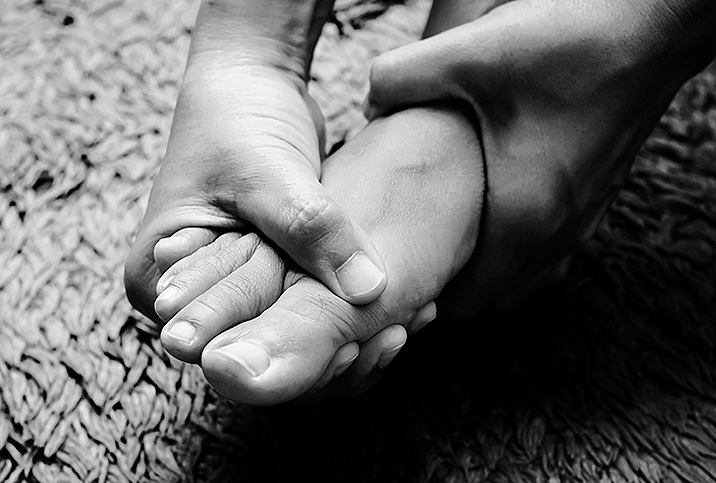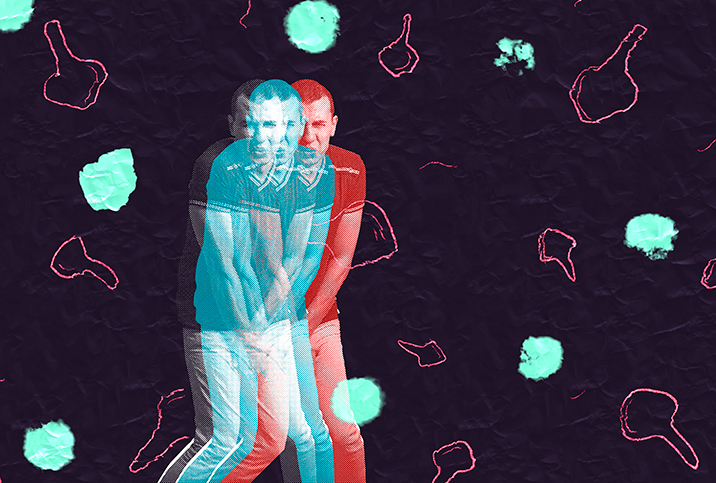What Could Be the Cause of Testicular Pain? These 4 May Surprise You

Key Points
- Testicular pain comes in many different shapes and sizes, from dull and aching to sharp and sudden.
- However, that pain could be originating from somewhere other than the testicles.
- Kidney stones, hernias, a urinary tract infection (UTI) or a sexually transmitted infection (STI) could be the cause of that uncomfortable sensation.
Testicular pain can be felt in one or both residents of the scrotum. It may be dull and aching, or it can be sharp and sudden. Sometimes, ball pain requires immediate medical attention. Other times, it's something a little ice and rest can fix.
It doesn't always mean the pain is being caused by the testicles themselves, though.
Where does ball pain come from?
"Although the pain is felt in the testicle or scrotum, in fact, sometimes the pain is being referred from another site, which can seem confusing," said Deborah Lee, M.B., Ch.B., a sexual and reproductive health specialist at Dr Fox, an online pharmacy in the United Kingdom.
The innervation of the testicle tracks up to the kidney, said S. Adam Ramin, M.D., a urologic surgeon and the medical director of Urology Cancer Specialists in Los Angeles. This is because the testicles develop in utero at the kidney level and descend down through the inguinal canal into the scrotum.
"Therefore, if you have a problem in the testis, you might not just develop pain in the testicle, but it can also radiate through the inguinal canal to the flank area up to the kidney," Ramin said.
Understanding the cause of testicular pain is essential, as it could potentially indicate testicle conditions. Swift and accurate diagnosis is important to address the issue promptly. Some causes of testicular pain can be serious if left untreated.
When testicular pain is caused by something other than a problem with the testicle itself, it is called referred pain, Lee said.
Here, we explore four common causes of testicular pain that don't originate from the testes.
Kidney stones
Kidney stones, hardened formations originating from urine, can vary in size from gravel-like particles to golf ball-sized lumps.
"Around 11 percent of men and 10 percent of women will develop kidney stones," Lee said.
You are more likely to develop kidney stones if you have a history of the following conditions, she said:
- High blood pressure
- Diabetes
- Obesity
- Dehydration
- Lack of exercise
- Kidney stones in your family
Once a stone has formed in the kidney, it may pass out of the kidney through the ureter, the tube that connects the kidney to the bladder.
A kidney stone can get stuck anywhere in the renal tract, Lee said. That could occur in the kidney, the ureter, the bladder or the prostate. If it causes a blockage, urine builds up behind the stone, causing pain.
The presence of a kidney stone can cause low back pain or abdominal pain. If the stone causes an acute blockage, the pain is sudden, acute and severe, known as acute renal colic. Symptoms of acute renal colic include fever, chills, nausea, vomiting and blood in the urine, according to the Cleveland Clinic.
"In men, the pain typically radiates from the upper back to the groin and testicle," Lee said.
Diagnosis often involves a specific type of X-ray—a kidney, ureter or bladder X-ray, as kidney stones are generally radio-opaque—or sometimes a high-resolution computerized tomography (CT) scan is needed.
Treatment options range from natural passage through hydration to lithotripsy, a procedure that uses sound waves to break the stones.
Surgical interventions, such as percutaneous nephrolithotomy, may be necessary in more severe cases.
To prevent recurrences, Lee said, maintain healthy habits such as the following:
- Consume a high water intake (3 liters daily)
- Add fresh lemon juice to your water
- Follow a low-salt diet
- Avoid sugary or fizzy drinks when possible
Inguinal hernia
In the male anatomy, the vas deferens is the tubing that carries sperm from the testicle to the prostate's ejaculatory duct, traversing through the inguinal canal en route.
"When a patient has an inguinal hernia, the pressure developed in the inguinal canal causes irritation and sometimes inflammation of the vas deferens," Ramin said. "This will lead to testicular pain."
Inguinal hernias in males can cause several symptoms, Lee said, including the following:
- Testicular or scrotal pain
- A sensation of heaviness in the groin
- A visible bulge near the pubic bone
- Discomfort when bending or straining
- Pain in the pelvic region or leg
Several risk factors contribute to the development of inguinal hernias, such as congenital predisposition, previous abdominal surgery, chronic cough, constipation-related straining, frequent exercise, heavy manual labor, extended periods of standing and chronic obesity.
Diagnosis primarily relies on a physical examination by a healthcare provider, which could lead to a referral to a general surgeon for further evaluation and potential surgical repair.
Depending on the severity, surgical intervention, known as inguinal herniorrhaphy, can be performed laparoscopically or with robotic assistance. This surgery is typically performed under local or general anesthesia.
Recommended
- How in the Heck Are Constipation and Testicle Pain Connected?: Bloated and backed up with an ache in your balls? It could be a cause of referral pain.
- Hydroceles and 6 Other Common Testicle Issues: Penis health isn't all you should focus on. Don't forget about your testicles.
- 7 Testicle Troubles That Should Send You to Your Doctor: Knowing when your boys need an intervention—and acting quickly—could be the key to keeping them.
Urinary tract infection (UTI)
"Men are far less likely than women to have a UTI. Twelve percent of men will have a UTI in a lifetime, compared to 40 to 60 percent of women," Lee said.
The urinary tract includes the urethra, prostate, testicle, epididymis, bladder, ureter and kidney. While a bladder infection usually does not cause pain in the testicle, infections in other locations of the urinary tract—testicle, epididymis, prostate, kidney—will cause testis pain, Ramin said.
Men with a UTI may experience a range of uncomfortable symptoms, such as painful urination, frequent trips to the bathroom, cloudy and smelly urine, and blood in the urine. The discomfort can extend to the lower abdomen and may involve pain in one or both testicles.
More serious symptoms, such as fever, nausea, vomiting and lower back pain, can occur when the infection spreads to the kidneys.
Diagnosing a UTI involves sending a midstream urine sample (MSU) to the lab that not only confirms the responsible organism but detects white cells and sometimes blood in the urine.
"The MSU helps to determine the correct antibiotic for treatment," Lee said. "And the lab will also check the urine for glucose to exclude diabetes."
Stay well-hydrated to help flush out a urine infection. If you have any of the above symptoms, don't hesitate to seek medical help for a prompt recovery.
Sexually transmitted infections (STIs)
Testicular pain can be an indicator of an STI or sexually transmitted disease (STD) in men. This is because STDs such as chlamydia and gonorrhea cause epididymitis and epididymo-orchitis (inflammation in the epididymis and testis), Lee said.
The epididymis is a coiled tube at the back of the testicle and because it sits so close to the testicle, any infection that causes inflammation can cause the testicle to feel painful.
"Fifty percent of cases of epididymitis are due to chlamydia or gonorrhea in men ages 39 and under," Lee said. "Above this age, epididymitis is usually due to E.coli infection that has originated from the GI tract."
If you have testicular pain and think it may be due to an STI or STD, it's important to see your primary healthcare provider or go to a sexual health clinic. They will perform an examination looking for urethral discharge (discharge from the tip of the penis) and look for any redness, swelling or tenderness of the testes.
The bottom line
Testicular pain can be a concerning symptom with various potential causes beyond the testicles. From kidney stones to inguinal hernias to sexually transmitted diseases such as gonorrhea or chlamydia, there are many conditions that can cause ball pain.
If you are experiencing testicular pain, speak with your doctor.


















